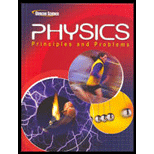
Concept explainers
The final temperature of the mixture.
Answer to Problem 8PP
The final temperature of the mixture is
Explanation of Solution
Given:
A water sample of
Formula Used:
When a hot object at a temperature
Now, if the mass of the object and water is
Now, a third substance is added to the mixture after reaching equilibrium. This can be treated in the same way as the two-substance case, with one of the substance being the mixture itself and the other being the third substance.
Calculation:
Here, firstly two components(which is water) are mixed together. Both the hot water and the cold water are having the same mass of
The temperature of hot water in Kelvin can be calculated as,
Similarly, the temperature of cold water in Kelvin is,
Substituting the given parameters in equation (1), equilibrium temperature is obtained as,
Now,
The temperature of methanol in Kelvin is,
In the new mixture, the other component is water with a mass
Therefore, considering (1) again for the new mixture, the equilibrium temperature can be obtained as,
Thus, the equilibrium temperature of the final mixture in degree Celsius is,
Conclusion:
Thus, the equilibrium temperature of final mixture is
Chapter 12 Solutions
Glencoe Physics: Principles and Problems, Student Edition
Additional Science Textbook Solutions
Sears And Zemansky's University Physics With Modern Physics
College Physics: A Strategic Approach (4th Edition)
Physics for Scientists and Engineers: A Strategic Approach, Vol. 1 (Chs 1-21) (4th Edition)
Tutorials in Introductory Physics
College Physics
University Physics with Modern Physics (14th Edition)
 College PhysicsPhysicsISBN:9781305952300Author:Raymond A. Serway, Chris VuillePublisher:Cengage Learning
College PhysicsPhysicsISBN:9781305952300Author:Raymond A. Serway, Chris VuillePublisher:Cengage Learning University Physics (14th Edition)PhysicsISBN:9780133969290Author:Hugh D. Young, Roger A. FreedmanPublisher:PEARSON
University Physics (14th Edition)PhysicsISBN:9780133969290Author:Hugh D. Young, Roger A. FreedmanPublisher:PEARSON Introduction To Quantum MechanicsPhysicsISBN:9781107189638Author:Griffiths, David J., Schroeter, Darrell F.Publisher:Cambridge University Press
Introduction To Quantum MechanicsPhysicsISBN:9781107189638Author:Griffiths, David J., Schroeter, Darrell F.Publisher:Cambridge University Press Physics for Scientists and EngineersPhysicsISBN:9781337553278Author:Raymond A. Serway, John W. JewettPublisher:Cengage Learning
Physics for Scientists and EngineersPhysicsISBN:9781337553278Author:Raymond A. Serway, John W. JewettPublisher:Cengage Learning Lecture- Tutorials for Introductory AstronomyPhysicsISBN:9780321820464Author:Edward E. Prather, Tim P. Slater, Jeff P. Adams, Gina BrissendenPublisher:Addison-Wesley
Lecture- Tutorials for Introductory AstronomyPhysicsISBN:9780321820464Author:Edward E. Prather, Tim P. Slater, Jeff P. Adams, Gina BrissendenPublisher:Addison-Wesley College Physics: A Strategic Approach (4th Editio...PhysicsISBN:9780134609034Author:Randall D. Knight (Professor Emeritus), Brian Jones, Stuart FieldPublisher:PEARSON
College Physics: A Strategic Approach (4th Editio...PhysicsISBN:9780134609034Author:Randall D. Knight (Professor Emeritus), Brian Jones, Stuart FieldPublisher:PEARSON





